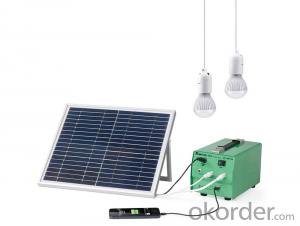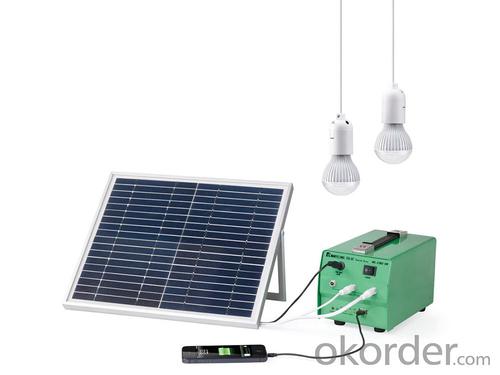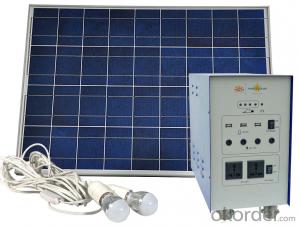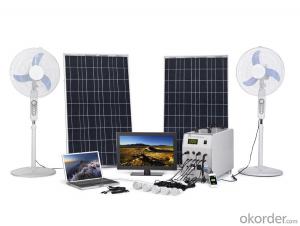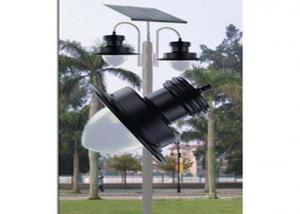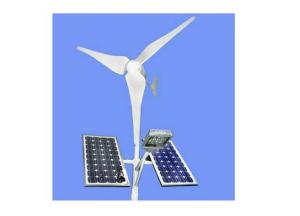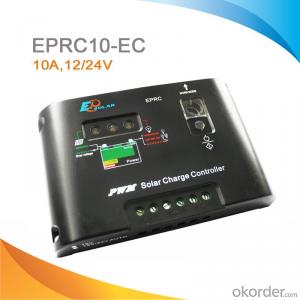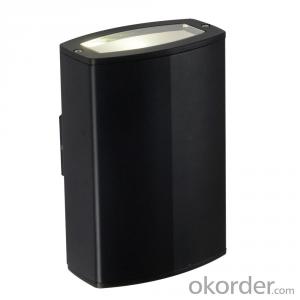Crest Solar Energy Systems - DC >10W Solar Lighting System
- Loading Port:
- Guangzhou
- Payment Terms:
- TT OR LC
- Min Order Qty:
- 50 set
- Supply Capability:
- 10000 set/month
OKorder Service Pledge
OKorder Financial Service
You Might Also Like
Features:
1.Solar panel : crystalline silicon 10W18V, efficiency>=16%;
2.Integrated power supply box :Built-in controller 3A12V and maintenance-free lead-acid battery 7AH12V;
3.LED lamp:3W12V,with 5M wires and switch, 2 sets;
4.Charing cable : 1 x USB cable 10-in-1;
5. Charging and using time: The empty battery could be full after charged 6hours. After the battery is full, 2 LED lamps could work 10hours;
6.Warranty: Panel 10 years; Battery 1 year; others 1 year.
| Item number | XT802A-10W |
| Solar panel | Poly crystalline 10W 18V |
| Battery | 7AH12V lead-acid battery |
| LED lamp | 3watt, >50000 hours |
| cable of led lamp | 5 m |
| Weight | 5.5kg/set |
| Output | DC 12V and DC 5V |
| Working Time @ full battery | 2 LED lamps totally using 10hours. |
| Warranty | 1 years |
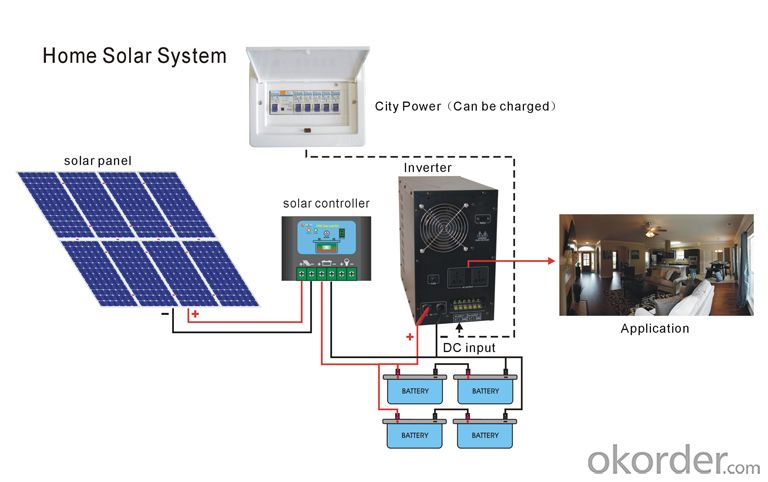
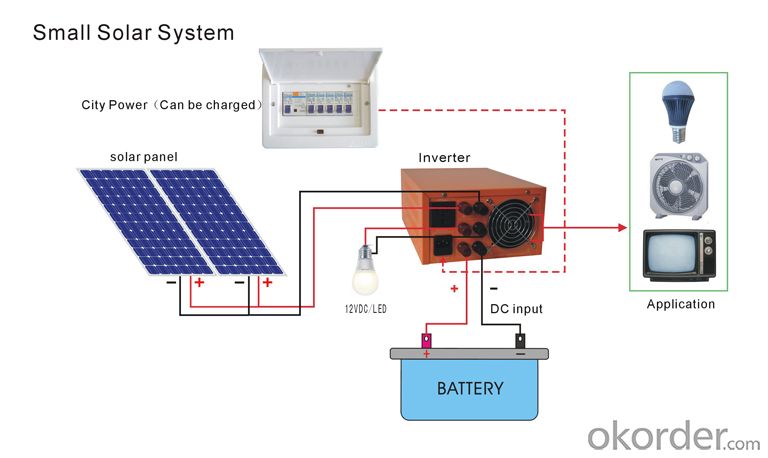
Quantuty
Quality goal:Constant innovation to meet the request of the customers. Protect the environment, provide environmental products to customer.
Quality strategy:
Quality: established high efficiency quality manager system in line with ISO9001 and ISO/TS16949.
Improvement: keeping improvement & quality guarantee.
Efficiency: delivery on time, complete the agreed events with the customers on time.
Service: focus on customers, provide the service and technology support on time.
FAQ
1. How long will my inquiry get response?
Your inquiry related to our products or prices will be replied within 24 hours.
2. Can I get professional service and suggestion?
Well-trained and experienced staffs to answer all your questions in fluent English.
3. Do you accept OEM or customized design?
OEM & ODM, any your customized lightings we can help you to design and put into product.
4. What if I need specific design?
Distributorship are offered for your unique design and some our current models.
- Q: How do solar energy systems impact noise pollution?
- Solar energy systems have a minimal impact on noise pollution because they operate silently, without any moving parts or combustion processes. This makes them an environmentally-friendly solution for generating electricity while significantly reducing noise levels compared to traditional energy sources like fossil fuels or generators.
- Q: Are there any noise or sound issues with solar energy systems?
- Solar energy systems do not typically cause noise or sound problems. Unlike fossil fuel power plants or wind turbines, solar panels do not have any components that move and create noise. They simply transform sunlight into electricity using photovoltaic cells, which is a quiet process. The only potential noise issue with solar energy systems could come from the inverters, which convert the direct current (DC) generated by the panels into alternating current (AC) for use in homes or businesses. However, modern inverters are designed to operate silently or produce minimal noise levels, often comparable to the background hum of household appliances. Consequently, noise or sound problems are generally not a concern with solar energy systems.
- Q: What is the role of batteries in off-grid solar energy systems?
- The role of batteries in off-grid solar energy systems is crucial as they serve as the primary storage devices for the generated solar energy. In off-grid systems, where there is no access to a utility grid, batteries are used to store excess solar energy produced during the day for use during the night or when the sun is not shining. Batteries store the energy in the form of chemical potential energy, which is converted back into electrical energy when needed. This allows for a continuous and reliable power supply, ensuring that electricity is available even when solar panels are not producing energy. Additionally, batteries provide stability and balance to the off-grid solar systems. They act as a buffer, absorbing fluctuations in energy production and demand. For instance, during periods of high energy demand, the batteries can discharge their stored energy to meet the load requirements, preventing any interruptions or power shortages. Furthermore, batteries also play a crucial role in maintaining the longevity and efficiency of the solar panels. By storing excess energy, batteries prevent the solar panels from being stressed by overproduction, which can lead to premature wear and tear or even damage. In conclusion, batteries are an essential component of off-grid solar energy systems as they enable energy storage, provide stability, and ensure a continuous power supply, making them indispensable for reliable and sustainable off-grid electricity generation.
- Q: Can solar energy systems be used for powering oil and gas extraction operations?
- Solar energy systems are capable of powering oil and gas extraction operations. The oil and gas industry has increasingly embraced the use of solar energy in recent years. Solar power can be employed to supply electricity for multiple activities, including pumping, drilling, and processing. This is especially advantageous in remote locations where grid access may be restricted or costly. By reducing the dependence on fossil fuels for power generation, solar energy systems contribute to lowering the carbon footprint of oil and gas extraction operations. Furthermore, solar power presents a sustainable and cost-effective solution, offering potential long-term savings in operational expenses compared to traditional energy sources.
- Q: Can solar energy systems be used for powering electric vehicle taxi services?
- Certainly, electric vehicle taxi services can certainly harness the power of solar energy systems. Solar energy, a renewable and sustainable power source, can be harnessed through the installation of solar panels. These panels convert sunlight into electricity, which in turn can charge the batteries of electric vehicles utilized for taxi services. By utilizing solar energy systems, taxi operators can significantly decrease their dependency on conventional electricity grids and fossil fuels. This not only aids in reducing greenhouse gas emissions but also cuts down on the expenses associated with running electric vehicle taxi services. Solar energy systems can be set up on the rooftops of taxi service stations or on the premises of charging stations. Any surplus energy generated during the day can be stored in batteries for later use during the night or on cloudy days when sunlight is scarce. Furthermore, solar energy can be employed to power the necessary infrastructure for electric vehicle taxi services. This encompasses charging stations, dispatch systems, and other operational equipment. Through incorporating solar power into these systems, taxi service providers can further enhance sustainability and reduce their carbon footprint. However, it is crucial to carefully plan the size of the solar energy system to meet the energy demands of the electric vehicle taxi fleet. Factors such as the number of vehicles, distance traveled, and the availability of sunlight should be taken into consideration when determining the appropriate size of the solar energy system. In conclusion, solar energy systems are indeed a viable option for powering electric vehicle taxi services. They offer a sustainable and cost-effective solution that reduces reliance on conventional energy sources and aids in mitigating climate change.
- Q: Are there any risks of electrical shock with solar energy systems?
- Solar energy systems carry potential risks of electrical shock. While generally considered safe, these systems can be hazardous due to the presence of high voltages and electrical currents. Failure to handle or manage them properly can result in accidents. Several key risks are associated with solar energy systems: 1. Installation and maintenance: Improper procedures during the installation and maintenance of solar panels can lead to contact with live electrical components. This can happen when safety protocols are not followed or when untrained individuals attempt to handle electrical connections. 2. Equipment or wiring malfunctions: Defective inverters, wiring, or other equipment can increase the risk of electrical shock. Poor installation practices or insufficient maintenance can also result in electrical faults, exposing individuals to dangerous currents. 3. Fire hazards: While not directly related to electrical shock, faulty electrical components or wiring can raise the risk of fires in solar energy systems. Attempting to extinguish such fires without shutting down the electrical system first can further worsen the risk of electrical shock. To minimize these risks, it is essential to adhere to proper installation and maintenance procedures. This often involves seeking assistance from licensed professionals. Furthermore, individuals working with solar energy systems should be trained in safety protocols, including the use of appropriate personal protective equipment and ensuring proper grounding of electrical systems. Regular inspections and maintenance are also crucial to detect and address any potential electrical hazards.
- Q: Can solar energy systems be used for powering off-grid telecommunications networks?
- Yes, solar energy systems can be used to power off-grid telecommunications networks. Solar panels can generate electricity from sunlight and store it in batteries, providing a reliable and sustainable power source for remote or isolated locations where traditional power infrastructure is unavailable or unreliable. This makes solar energy an ideal solution for powering off-grid telecommunications networks, ensuring continuous connectivity and communication in remote areas.
- Q: Can solar energy systems be used for powering electric vehicle charging stations?
- Yes, solar energy systems can be used to power electric vehicle charging stations. Solar panels can generate electricity from sunlight, which can then be used to charge electric vehicles. This not only reduces the reliance on fossil fuels but also helps in promoting clean and renewable energy sources for transportation.
- Q: Can solar energy systems be used for powering electric vehicle wireless charging systems?
- Yes, solar energy systems can indeed be used for powering electric vehicle wireless charging systems. The energy generated from solar panels can be converted into electricity and stored in batteries. This stored energy can then be utilized to power wireless charging stations for electric vehicles, providing a sustainable and renewable source of power for their charging needs.
- Q: Are solar energy systems scalable for different energy needs?
- Yes, solar energy systems are scalable for different energy needs. They can be designed and configured to meet the energy requirements of various scales, from small residential installations to large commercial or industrial projects. By adding or removing solar panels and adjusting the system's capacity, solar energy can be effectively scaled up or down to accommodate different energy demands. Additionally, advancements in technology and improved efficiency of solar panels have made it easier to scale solar energy systems to meet larger energy needs effectively.
Send your message to us
Crest Solar Energy Systems - DC >10W Solar Lighting System
- Loading Port:
- Guangzhou
- Payment Terms:
- TT OR LC
- Min Order Qty:
- 50 set
- Supply Capability:
- 10000 set/month
OKorder Service Pledge
OKorder Financial Service
Similar products
Hot products
Hot Searches
Related keywords
